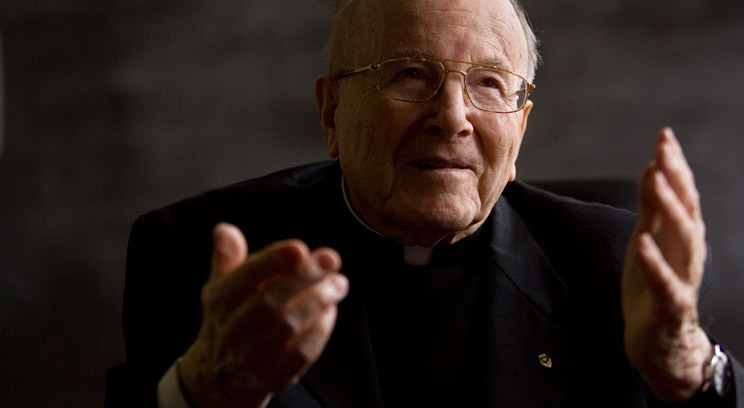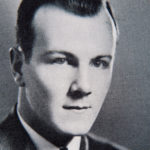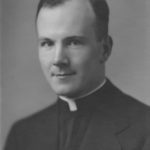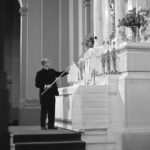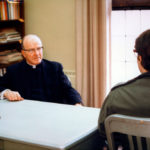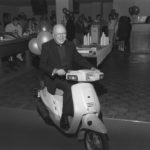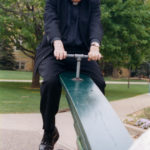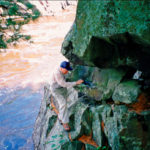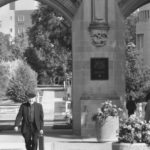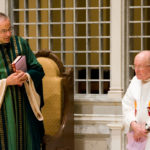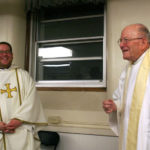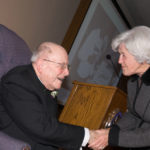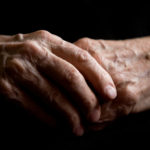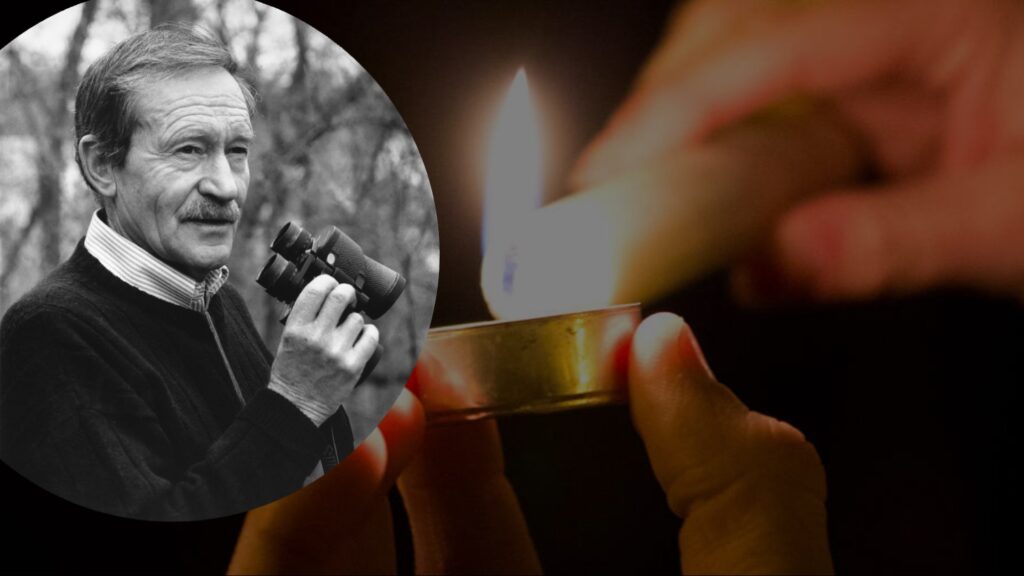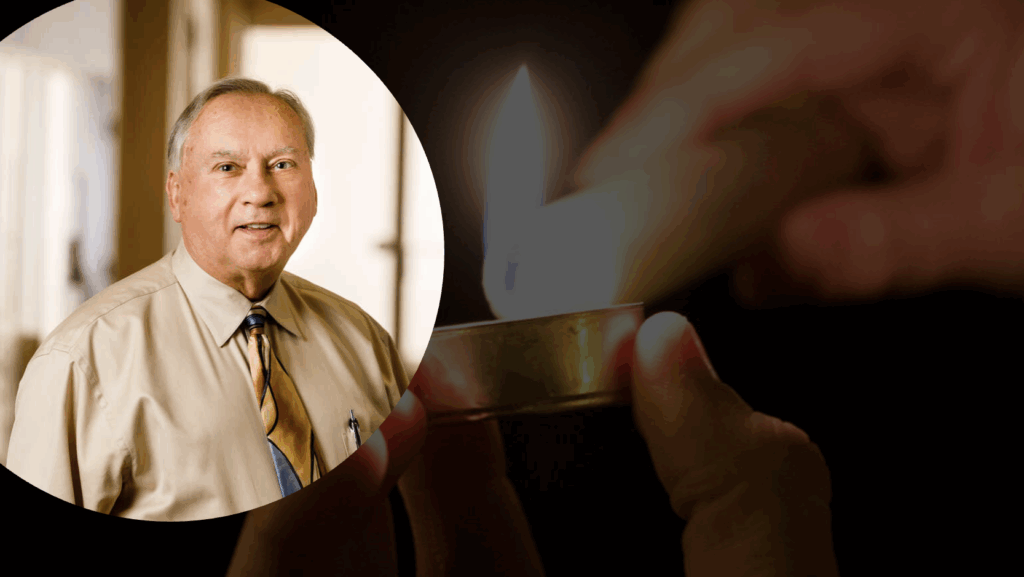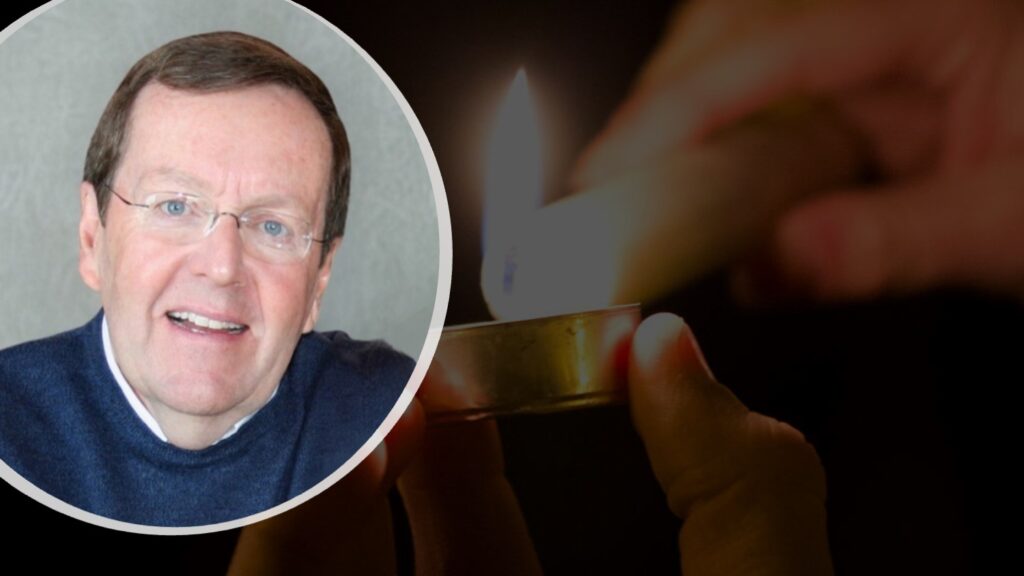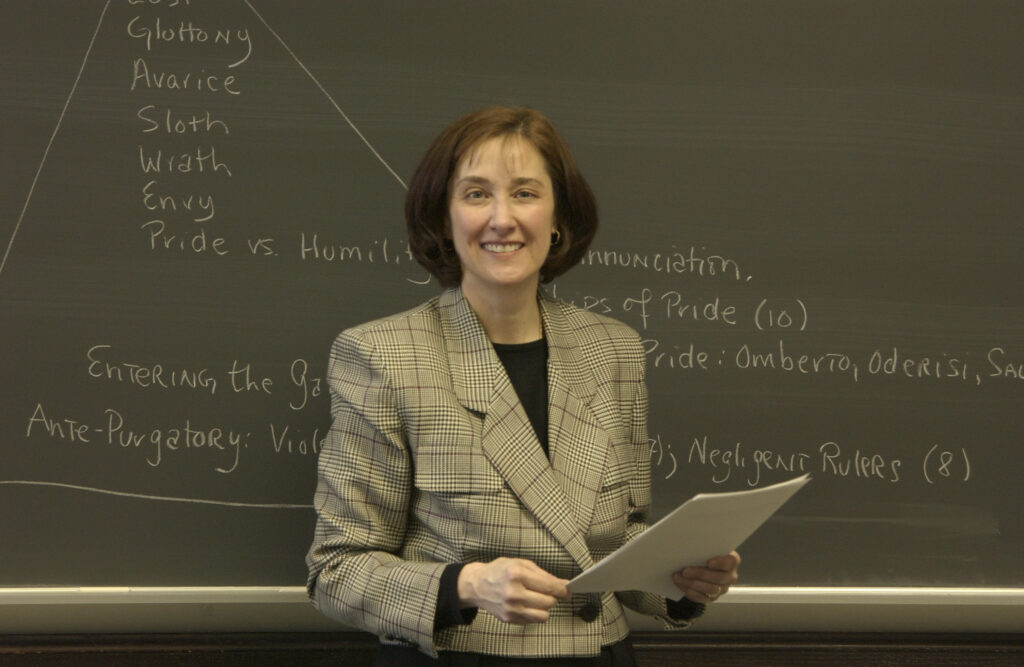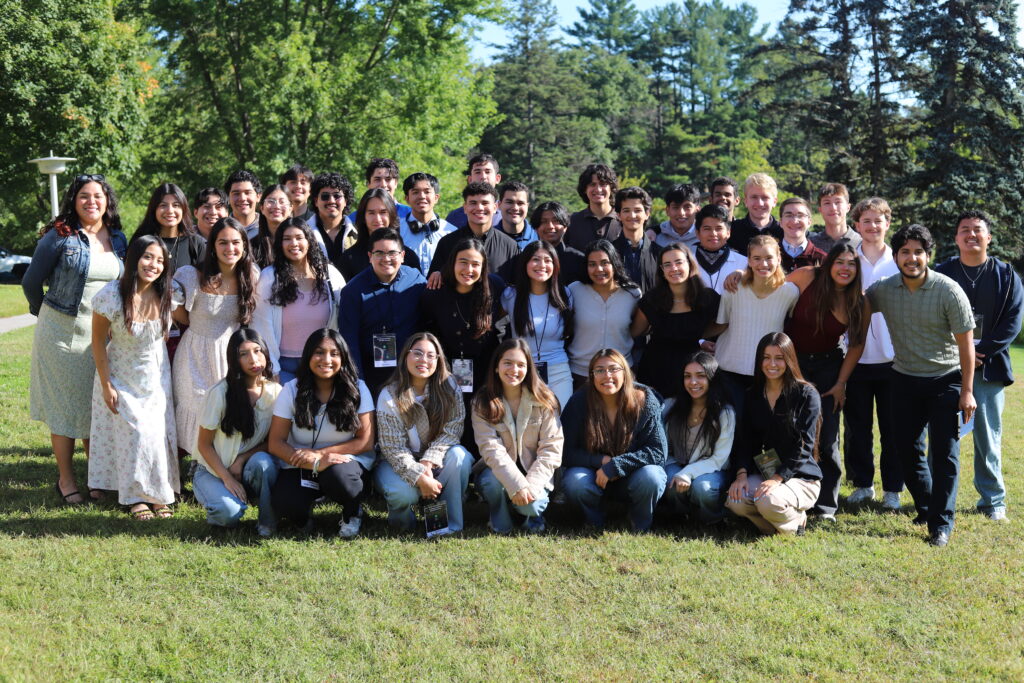Monsignor James Lavin, who devoted his life to serving the University of St. Thomas community, died Monday, Sept. 17, at the Little Sisters of the Poor residence near downtown St. Paul. He was 93.
Lavin had suffered from congestive heart failure and died of natural causes at the end of a 5:45 a.m. Mass celebrated in his room by Father Joseph Johnson, pastor of Holy Family parish in St. Louis Park.
"We got to the end of Mass," Johnson recalled. "I said, 'Go in peace,' and he breathed his last."
Lavin's funeral service will be at 9:30 a.m. Friday in the Chapel of St. Thomas Aquinas on the St. Paul campus, with a reception to follow in the field house of the Anderson Athletic and Recreation Complex. Visitation will be from 4 to 8 p.m. Thursday at O'Halloran and Murphy Funeral Home, 575 S. Snelling Ave., St. Paul.
Memorials can be made to the Little Sisters of the Poor or two University of St. Thomas funds: the Peanut Butter and Jelly Fund or the Monsignor James Lavin Endowed Scholarship Fund.
Survivors include two nieces and four nephews.
"Monsignor Lavin was one of the most beloved figures in the history of St. Thomas," said Father Dennis Dease, president of St. Thomas. "His paramount concern was always purely and simply for the welfare of students. They always knew that they could come to him with problems large and small, and he provided common-sense counsel in a soft-spoken but firm voice. He exemplified total dedication.We shall not soon forget him."
Lavin arrived at St. Thomas in 1936 as an undergraduate student and graduated summa cum laude with a degree in English in 1940. He returned to campus in 1946 after his ordination and taught religion until 1967, when he became an academic counselor. He went to work for the St. Thomas Alumni Association in 1988 as a special assistant to the president and a university ambassador who attended countless events, funerals, weddings and baptisms.
Known widely as "Scooter," he lived in Ireland Hall as an undergraduate from 1936 to 1940 and as a faculty member and administrator from 1946 to 2002. He began to offer peanut butter and jelly sandwiches, also known as "Lavin Burgers," in 1967 to residence hall students one or two evenings a week. Scooter's restaurant – the original in Murray-Herrick Campus Center and the new version in the Anderson Student Center – carries his name, as does an annual award for volunteer service to the Alumni Association.
"He remains the face of the institution to generations of alumni, a priest of deep faith and consummate compassion who came to know thousands of students by name by simply living with them," says a profile written about Lavin for a 2009 book on St. Thomas' 125 years. "He carried his lifelong ministry with him into a nursing home, saying Mass, hearing confessions and leading the Rosary."
When George Moskalik, a member of St. Thomas’ class of 1939, received the Monsignor James Lavin Award from the university’s Alumni Association in 1994, he said: “I can’t imagine St. Thomas without Monsignor Lavin – he is truly loved.”
A story in the autumn 1993 issue of St. Thomas magazine, written at the time of Lavin’s 75th birthday, said that his unofficial motto was: “I’ve got my feet on the ground; the prayers rise up to heaven.”
Born on the Iron Range
Five days after Lavin was born in Aurora, Minn., on Nov. 12, 1918, his mother died in a flu epidemic. He and his older brother, Edward, and stepbrother, Dennis, were raised with the help of a widowed housekeeper and later stepmother, Mary Jane St. Arnaud O’Brien.
During the Depression, his father moved the family to Minneapolis and took any construction field office job he could get, coming home for Christmas and Easter. The younger Lavin went to De La Salle High School, graduating in 1936 (he was named to the school’s Hall of Fame in 1990). He enrolled at St. Thomas, where he had minors in Latin and Greek in addition to his English major.
As chapel sacristan, Lavin had “time to talk to God," he once said. "The idea of being a priest came in my sophomore year.” When he wrote from St. Thomas to his father in Wyoming that he had decided to enter the seminary, it was the first his father had heard of the subject. But Lavin received, by return mail, “a wonderful letter in which my father said he had always prayed to God that one of my boys would be a priest.”
Lavin attended the St. Paul Seminary and was ordained on Aug. 18, 1945. He soon began teaching at St. Thomas and moved back into Ireland Hall.
His work experience included teaching at St. Joseph’s Academy, the College of St. Catherine and St. Thomas Academy. He also earned a master’s degree in counseling. In 1967, he was named director of student counseling until the department divided and he became director of academic counseling in 1973. He “retired” in 1988 and immediately went to work in the Alumni Association office.
Honored as St. Thomas’ “Humanitarian of the Year” in 1973, Lavin also is perhaps the only priest to have a pub named after him. In 1988, the alcohol-free “Scooter’s” opened in the lower level of Murray-Herrick. Lavin didn't remember who first named him “Scooter,” but the nickname surfaced in 1963 and referred to his brisk walk. “When I first came to St. Thomas,” he said, “I was called ‘Jumping’ Jim but I slowed down some and became Scooter.”
He was well-known for his life’s work with students, taking them on rock-climbing or snowshoeing expeditions. He was an avid hiker and mountain climber and during summer vacations he climbed to the summit of three 14,000-feet peaks in Colorado as well as Glacier Dome and Camp Mountain in British Columbia’s Purcell Range.
In grade school, Lavin had walked with a limp and doctors at the Mayo Clinic concluded he probably had contracted polio at some time. Surgery helped his walk, but for years he used exercise as therapy for his legs. To prepare for one of his mountain climbs, he left a leather chair in the doorway between his two rooms in Ireland Hall. The idea was to climb over the chair every time he moved from one room to another, and by the time he left for his trip, he was in shape to bushwhack through mountain brush.
He led a nightly prayer in Ireland Hall and was a friend to students and their families in times of crisis and grief. He loaned students money to fix their cars and buy their textbooks, regarding the money not as a loan but as a revolving fund (most paid it back). He also bailed students out of jail and accepted collect phone calls from dropouts anxious to re-enroll at St. Thomas.
“I don’t push myself on students, but I am always around,” he said at the opening of Scooter’s pub in 1988. “By living with them I am far more in touch with what they are thinking and how their lives are going than I would be in the formality of an office visit.”
“Finding God is a matter of knowing him by what he does,” Lavin said on another occasion, “and if we make a great effort to keep the commandments, a lot of problems of losing faith disappear. Deep down the roots of faith are there. Once you have them, you can, like dandelions, dig out the top, but below they are still growing, still alive.”
It would be impossible to estimate the number of peanut butter and jelly sandwiches that Lavin served outside his Ireland Hall room for 35 years before he moved out; the sandwiches still are served today. Each week, the hungry students chomped their way through 25 loaves of bread, 15 pounds of peanut butter and 10 pounds of jelly. Except for occasional contributions, Lavin paid for it all.
He was just as connected to another St. Thomas landmark, the Chapel of St. Thomas Aquinas – as a student he served as its sacristan and as a priest he celebrated Mass there almost daily. The chapel was nearly 80 years old when the university commissioned a book to serve as a detailed guide to the theological themes found in its art and architecture. Lavin authored the extensively illustrated book, The Chapel of St. Thomas Aquinas: Discovering its Message, published in 1997.
“Walk into the Chapel of St. Thomas Aquinas,” he wrote, “and you’ll see … in the windows, walls and ceilings … an artistic course in Catholic theology portraying nothing less than ‘the whole plan of God’s dealing with men.’ ”
Two Alumni Felt a Special Connection
Two alumni – Tim Fischer '84 and Fred Soucie '73 – said that Lavin indeed was "always around."
"He made everybody feel close to him," said Fischer, a senior gift officer in the St. Thomas Development Office. "You couldn’t avoid but be drawn in by the twinkle in his eye and his eagerness to get to know who you were and what you were all about."
Fischer lived in Ireland Hall as a freshman and sophomore, and recalled their first meeting. Fischer had returned to campus in the early-morning hours, having been "pretty overserved" at a local bar, he admitted, and took pool balls from the basement to the second-floor hallway, where he set them up on the floor.
"On that terrazzo floor, you could hear every bounce of the pool ball," Fischer said. "Laying down, I felt a tap at my ribs. I looked around and it was Father Lavin. 'What in the world do you think you're doing?' he asked me. 'Playing pool,' I said. 'Pick 'em up and follow me,' he said. I followed him upstairs and he quietly proceeded to fix me a sandwich, sat me down and explained how things worked at St. Thomas. From that time on, he was a mentor and a friend."
As a sophomore, Fischer said, he struggled with his Introductory to Theology course and went to Lavin to ask where he could find a tutor.
"He told me that he'd be happy to help me, and he also said, 'Everybody has a gift, and your gift seems to be in the weight room,' referring to how I liked to work out. 'You may have to spend a little more time with the books.' He then would sit with Father (Roy) Lepak (the professor who taught the course) at lunch, find out the next lesson in class and tutor me. I think I got a C, and we both celebrated."
Fischer returned to campus to work in 2006. "One of the things that always happens in my job is that people ask, 'How is Father Lavin doing?' and it was great because I could tell them. Everybody has a Father Lavin story — about his peanut butter and jelly sandwiches, or about loaning gas money or letting them use his car for a first date. I just feel lucky that I have more than one story."
Soucie was one of those students who received "loans" from Lavin.
"He had a sixth sense about him," said Soucie, who received the Mr. Tommy Award in 1973 and today is a lawyer in Coon Rapids, with two daughters (Sarah and Ruth) as fellow St. Thomas graduates. "He had his fingers on the pulse of the campus in a remarkable way, and he knew which kids needed help the most. He always knew when I was broke, and he would have me run errands for him and give me $10. That was a fortune back then. He would go to bat for kids all the time, and he also would ask me to help him to look out for students."
Soucie recalled how he had a puppy in Ireland Hall his junior year, against the rules.
"I named him Becket (after St. Thomas Becket, a 12th century priest), Soucie said. "Father Lavin would stop by my room with a treat for the puppy, and then we'd go outside and play. Father Lavin not only looked the other way, but he brought Becket treats!"
Soucie went to see Lavin last Thursday.
"When I walked in his room, he was asleep with his head back, and I went over and sat down next to him and said, 'Hello, Father.' He looked a little glazed, and then his eyes recognized me. We gave each other a hug and I kissed him on the forehead. We had a great visit. I gave him water and said, "I know it's hard for you to speak. I'll do the talking.' So we talked – we told Annie Scanlan stories (about a campus nurse in the 1960s and 1970s) and we laughed -- not very loud or long, but we still laughed."
Prayers and Mass Filled His Final Hours
Johnson visited Lavin on Saturday and decided to stay overnight with him on Sunday. The Little Sisters of the Poor have a tradition of praying with a resident who is dying, Johnson said, "and so we prayed all night." Lavin was conscious much of the time.
"I celebrated the Mass for the Dying," Johnson said, "and was able to give him Communion, which is called Viaticum when it's given to a dying person. It's the grace for the final passage."
Johnson recalled having talked with Lavin about death over the summer, and again when he was in the hospital last month with heart problems.
"When he came back to the Little Sisters residence, we were getting him settled and he looked at me and said, 'That's the last time,' meaning the hospital. He was ready. A couple of weeks ago, when he had another heart episode, the sisters told him, 'It's time to take you to the hospital,' and he said, 'No, sister, I'm ready.'
"He was a priest. He knew his whole life journey was toward eternity. He enjoyed nearly a century here on earth, but he always knew that his destination was somewhere else."
Editor's note: We will continue to update this story as we receive more information.
